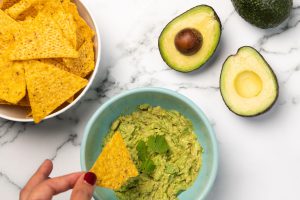As we enter the second year of the COVID-19 pandemic, the prospect of catching the virus has become less of a barrier to many of us conducting daily life. Even for those of us who are vaccinated and boosted, it is important to be aware of how to care for ourselves—and our loved ones—while recovering from a case of COVID. One way to do that is through nutrition.
Recently, the UF/IFAS Food Science and Human Nutrition Department has published a short article on COVID-19 and Nutrition. This article, written by Farah Tadros, Susannah Folsom, and Jeanette Andrade, covers the importance of hydration, what foods to consume, and special adjustments and requirement waivers from food assistance programs such as SNAP and WIC.
 Not Just Water
Not Just Water
Hydration is especially helpful to consider. Sometimes, if you’ve become dehydrated due to fever, vomiting, or diarrhea, you need more than just water! This article provides tips on how to keep hydrated, including drinking a variety of beverages containing electrolytes, as well as a recipe for an at-home rehydration liquid.
Are You Eating Enough?

Keeping up your calorie intake is also important. When I’m sick with even a mild cold, I don’t want to eat. Combine that loss of appetite with nausea and loss of taste and smell, and it becomes even more difficult. But your body needs calories to fight a virus. Meeting your protein requirements is also important. Not only can it help you maintain muscle tissue, but adequate protein can also help with antibody production.
Tadros, Folsom, and Andrade provide several strategies to make sure you meet your daily calorie needs. Their article also includes a table of foods with their average protein amounts per serving. One tip I’ll be keeping in mind is if full meals are challenging, to focus on eating smaller meals about twice as often, around six times a day.
Further Resources
For more resources on COVID-19, including select translations into Spanish, Haitian Creole, and Mandarin Chinese, see the Ask IFAS topic page on the subject. See also our topic pages on Health and Nutrition and Health and Nutrition for Special Populations. And, as always, for anything else, just Ask IFAS!
 2
2

